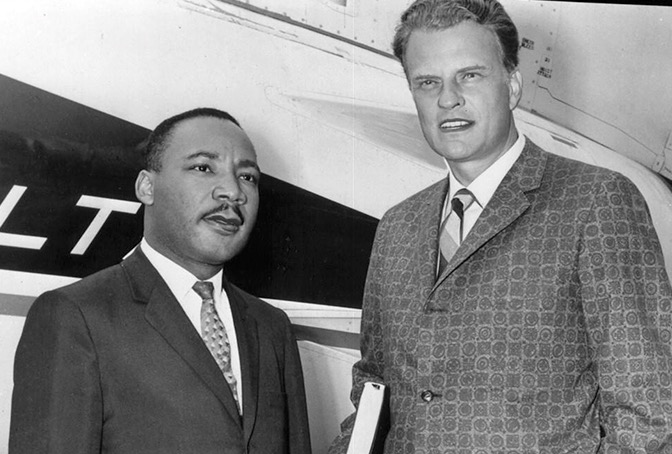As the nation celebrates Martin Luther King Jr. Day, one of the many details of King’s phenomenal life and legacy that is worth exploring is the preacher’s fascinating relationship with the Rev. Billy Graham.
The two pastors met at a Crusade meeting in New York City back in 1957 and immediately became friends. Later on, Graham, a white pastor, and King, a black civil rights icon, were quite open about their adoration for one another.
And that relationship is ever-instructive to a culture today that is continuously divided along a slew of ideological and racial lines.
“One night civil rights leader Dr. Martin Luther King, Jr., whom I was pleased to count a friend, gave an eloquent opening prayer at the service,” Graham wrote in his autobiography of King. “He also came at my invitation to one of our Team retreats during the Crusade to help us understand the racial situation in America more fully.”
In a video posted to son Franklin Graham’s Facebook page, Billy Graham recalled the day he sparked controversy by taking down the ropes that separated white people and black people at his crusade events in the south. He says the head usher resigned over the incident, but it did spark a friendship and partnership with Martin Luther King, Jr.
https://www.facebook.com/FranklinGraham/videos/1789494141106759/
And King’s stirring prayer at that event still carries some lessons for us all, decades after he first uttered it (text via Gospel Coalition):
Let us pray.
O God, our Heavenly Father—out of whose mind this great cosmic universe has been created, toward whom the weary and perplexed of all generations turn for consolation and direction—we come before Thy presence this evening thanking Thee for the many blessings of life.
We come recognizing our dependence on Thee.
We also come, O God, with an awareness:
The fact that we have not always given our lives to that which is high and noble.
In the midst of all of the high and noble aspects of justice,
we followed injustice.
We stand amid the forces of truth,
and yet we deliberately lie.
We stand amid the compelling urgency of the Lord of love, as exemplified in the life of Jesus Christ,
and yet we live our lives so often in the dungeons of hate.
For all of these sins, O God, forgive.
And in these days of emotional tension—when the problems of the world are gigantic in extent and chaotic in detail—give us penetrating vision, broad understanding, power of endurance, and abiding faith, and save us from the paralysis of crippling fear.
And O God, we ask Thee to help us to work with renewed vigor for a warless world and for a brotherhood that transcends race or color.
We thank Thee this evening for the marvelous things which have been done in this city, and through the dynamic preachings of this great evangelist.
And we ask Thee, O God, to continue blessing him. Give him continued power and authority.
And as we look into him tonight, grant that our hearts and spirit will be opened to the divine inflow.
All of these things we ask, in the name of Him who taught us to pray.
Our Father [audience also begins to pray],
who art in heaven,
hallowed be Thy name. . . .
[Audience continues prayer without King.]
That powerful prayer clearly resonated — and it offers some much-needed advice for us as we remain in the midst of a fragile and tattered culture.
The prayer also once again shows King’s affections for Graham, whom he called a “great evangelist.” Later on in the duo’s relationship, King also offered praise for Graham’s role in fighting segregation.
In fact, the civil rights leader believed that Graham had greatly contributed to the success of the movement.
“Had it not been for the ministry of my good friend Dr. Billy Graham, my work in the Civil Rights Movement would not have been as successful as it has been,” King once said, according to the Billy Graham Evangelistic Association.
The King Center noted that Graham once paid King’s bail and that he toured Alabama in 1965 after Selma violence. And when Graham learned that King was gunned down on April 4, 1968, in Memphis, Tennessee, Graham was in absolute shock.
“I was almost in a state of shock,” Graham said of the moment he found out. “Not only was I losing a friend through a vicious and senseless killing, but America was losing a social leader and a prophet, and I felt his death would be one of the greatest tragedies in our history.”
May King’s lessons live on and take root in the hearts of men and women across the nation – and the globe.



